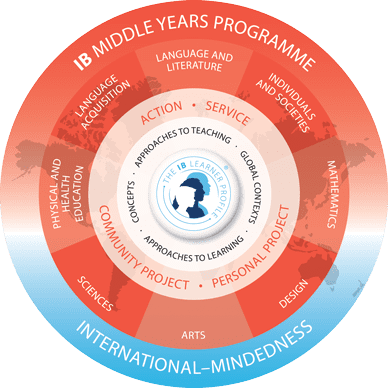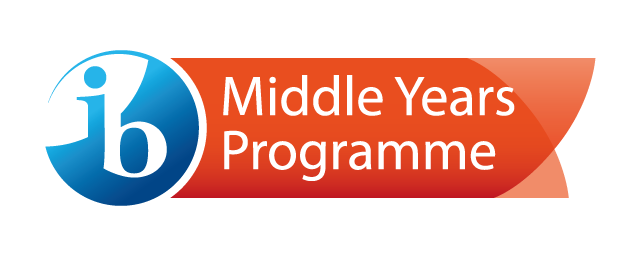International Baccalaureate MYP
Overview of International Baccalaureate MYP
International Baccalaureate (IB) Middle Year Program (MYP)
The International Baccalaureate (IB) Middle Years Programme (MYP) is a well-rounded, age-appropriate program that nurtures students’ physical, intellectual, emotional, and ethical development. As the starting point for the journey toward the IB Diploma, the MYP combines the Ontario Ministry of Education curriculum with an enriched framework. This approach enhances learning through hands-on experiences, a focus on global awareness, and community service.
Designed for students aged 11 to 16, the program in Ontario corresponds to Grade 7 (Year 2), Grade 8 (Year 3), Grade 9 (Year 4), and Grade 10 (Year 5).
The MYP curriculum framework comprises eight subject groups (Language Acquisition, Language and Literature, Individuals and Societies, Sciences, Mathematics,
Arts, Physical and Health Education, Design), providing a broad and balanced education for early adolescents.
The MYP requires at least 50 hours of teaching time for each subject group in each year of the programme. In years 4 and 5, students have the option to take courses from six of the eight subject groups within certain limits, to provide greater flexibility in meeting local requirements and individual student learning needs.
International Baccalaureate (IB) Middle Years Programme (MYP) Curriculum

The ability to communicate in more than one language is essential to the concept of an international
education that promotes intercultural understanding, and it is central to the IB’s mission. The study of
additional languages in the MYP provides students with the opportunity to develop insights into the
features, processes and craft of language and the concept of culture, and to realize that there are diverse
ways of living, behaving and viewing the world.
Acquiring an additional language and exploring and reflecting on the cultural perspectives of our own
and other communities:
- Are central to developing critical thinking and international-mindedness
- Provide an intellectual framework to support personal development, cultural identity and conceptual
understanding - Greatly contribute to the holistic development of students and to the strengthening of lifelong
learning skills - Equip students with the necessary multiliteracy skills and attitudes to communicate successfully in
various global contexts.
Language is fundamental to learning, thinking and communicating, as well as providing an intellectual framework to support conceptual development. It plays a central role in developing critical thinking, cultivating international-mindedness, exploring and sustaining personal development and cultural identity, and responsibly participating in local, national and global communities.
MYP language and literature courses equip students with linguistic, analytical and communicative skills that help to develop interdisciplinary understanding. Students develop skills in six domains—listening, speaking, reading, writing, viewing and presenting—both independently and with others.
MYP language and literature courses include a balanced study of genres and literary texts, including a world literature component. Students’ interactions with texts generate moral, social, economic, political, cultural
and environmental insights. Through their studies, students learn how to form opinions, make decisions, and engage in ethical reasoning.
The MYP individuals and societies subject group incorporates disciplines traditionally studied under humanities and social sciences. This subject group encourages learners to respect and understand the world around them, and equips them with the necessary skills to inquire into historical, geographical, political, social, economic, and cultural factors that affect individuals, societies and environments.
The study of individuals and societies helps students to appreciate critically the diversity of human culture, attitudes and beliefs. Courses in this subject group are important for helping students to recognize that both content and methodology can be debatable and controversial, and for practising the tolerance of uncertainty.
The IB’s approach to this subject area includes a strong focus on inquiry and investigation. Students collect, describe and analyse data; test hypotheses; and learn how to interpret increasingly complex information,
including original source material. This focus on real-world examples, research and analysis is an essential aspect of the subject group and relevant to their lives and be encouraged to apply it to new situations
With inquiry at the core, the MYP sciences framework aims to guide students to independently and collaboratively investigate issues through research, observation and experimentation. The MYP sciences curriculum explores the connections between science and everyday life. As they investigate real examples of science applications, students discover the tensions and dependencies between science and morality, ethics, culture, economics, politics, and the environment. Scientific inquiry fosters critical and creative thinking about research and design, as well as the identification of assumptions and alternative explanations. Students learn to appreciate and respect the ideas of others, gain good ethical-reasoning skills and further develop their sense of responsibility as members of local and global communities.
The framework for MYP mathematics outlines four branches of mathematical study.
1. Numerical and abstract reasoning
2. Thinking with models
3. Spatial reasoning
4. Reasoning with data
The study of mathematics is a fundamental part of a balanced education. It promotes a powerful universal language, analytical reasoning and problem-solving skills that contribute to the development of logical, abstract and critical thinking. The MYP mathematics and extended mathematics courses promote both inquiry and application, helping students to develop problem-solving techniques that transcend the discipline and are useful in the world outside school.
Mathematics in the MYP is tailored to the needs of students, seeking to intrigue and motivate them to want to learn its principles. Students should see authentic examples of how mathematics is useful and relevant to their lives and be encouraged to apply it to new situations.
The arts in the MYP seek to stimulate young imaginations, challenge perceptions and develop creative and analytical skills. Involvement in the arts encourages students to understand the arts in context and the cultural histories of artworks, thus supporting the development of an inquiring and empathetic world view. The arts challenge and enrich personal identity, and build awareness of the aesthetic in a real-world context. Through development of the imagination, students can become more empathetic and compassionate, they can enrich their cultural lives and discover new ways to contribute actively both to their own communities and to the world.
The MYP values the processes of creating, performing and presenting artwork, and gives students opportunities to function as artists and to develop as learners. Students learn to use the arts to convey feelings, experiences and ideas about the world, and in doing so they acquire and develop techniques and creative skills. They learn the value of reflection and evaluation as a means of developing their ideas, their skills and their work.
MYP physical and health education aims to empower students to understand and appreciate the value of being physically active while developing the motivation for making healthy and informed life choices. To this end, physical and health education courses foster the development of knowledge, skills and attitudes contributing to a balanced and healthy lifestyle.
Students engaged in physical and health education will explore a variety of concepts that help foster an awareness of physical development and health perspectives, as well as positive social interaction. Physical activity and health are of central importance to human identity and global communities, creating meaningful connections among people, nations, cultures and the natural world.
Through physical and health education, students learn to appreciate and respect the ideas of others, and develop effective collaboration and communication skills. This subject area also offers many opportunities to build positive interpersonal relationships that can help students to develop a sense of social responsibility and intercultural understanding.
Design, and the resultant development of new technologies, has given rise to profound changes in society, transforming how we access and process information, adapt our environment, communicate with others,
solve problems, work and live. MYP design challenges students to apply practical and creative-thinking skills to solve design problems; encourages students to explore the role of design in historical and contemporary contexts; and raises students’ awareness of their responsibilities when making design decisions and taking action.
Inquiry and problem-solving are at the heart of design. MYP design requires the use of the design cycle as a tool, which provides: the methodology to structure the inquiry and analyse problems; the development of feasible solutions; the creation of solutions; and the testing and evaluation of the solution. In MYP design, a solution can be a model, prototype, product or system independently created and developed by students.
York Region Tutoring Provides
If a student is approaching a forthcoming test, we can provide them with a previous test to be completed at home before their upcoming session. Subsequently, during their next class, just before the exam, they can review the test with their tutor. These tests are exclusively sourced from high schools in York Region and other areas in Ontario, serving as the definitive benchmark for students to assess their readiness.
York Region Tutors and are equipped with drawing tablets making collaboration simple, efficient and effective. We also offer drawing tablets at a discount for purchase to students who really take to the functionality of the product.
At the parents’ request, following each tutoring session, our tutors can assign homework tailored to address weaknesses and reinforce strengths in students. Additionally, we incorporate homework questions directly extracted from previous tests and quizzes administered by YRDSB school teachers, allowing students to familiarize themselves with potential test questions.

